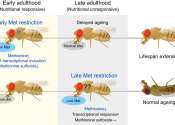Video: Busting plant-based diet myths
Many people eat a plant-based diet for health benefits and cultural and religious beliefs, while others just enjoy the savory taste of fruits and vegetables.
Apr 18, 2024
0
0
Many people eat a plant-based diet for health benefits and cultural and religious beliefs, while others just enjoy the savory taste of fruits and vegetables.
Apr 18, 2024
0
0

The human brain contains approximately 87 billion neurons. On average, each of these cells make thousands of different connections to facilitate communication across the brain. Neural communication is thought to underlie ...
Apr 16, 2024
0
27

Consuming sugar-sweetened drinks in the first few years of childhood can be linked to poor diet patterns that increase the risk of obesity in later life, according to a new study by the School of Psychology at Swansea University.
Apr 12, 2024
0
1

Lunchables, those ubiquitous plastic packets of cheese, deli meats and crackers that many parents choose for convenience, contain concerning levels of lead and sodium, Consumer Reports warns.
Apr 11, 2024
0
1

A recent collaborative study has discovered rare variants in the YKT6 gene as the cause of a new neurological disorder characterized by developmental delays along with severe progressive liver disease and a potential risk ...
Apr 2, 2024
0
96

Fruit flies live considerably longer when fed a diet that limits consumption of a certain amino acid during early adulthood, RIKEN biologists have found. If a similar effect occurs in humans, it could allow people to live ...
Mar 26, 2024
0
54

Motor neurons are the cells the brain uses to command muscles to act. Scientists typically thought of them as simple connections, much like the cables that link computers with their accessories. Now, in fly studies, researchers ...
Mar 20, 2024
0
63

A small, long-term study of almost 500 children in Massachusetts has found that regularly drinking sugary drinks and 100% fruit juices during childhood and adolescence may be linked to a higher risk of developing Type 2 diabetes ...
Mar 19, 2024
0
1

Fatty liver, which can lead to liver damage and disease, can occur from both overeating and starvation. Now, new research shows how naturally starvation-resistant cavefish, unlike other animals, are able to protect their ...
Mar 18, 2024
0
12

Adhesion GPCRs are a group of G protein-coupled receptors associated with many bodily functions and diseases in humans. Scientists at Leipzig University have discovered a new receptor—which they have named "mayo"—and ...
Mar 15, 2024
0
32

The term fruit has different meanings dependent on context, and the term is not synonymous in food preparation and biology. Fruits are the means by which flowering plants disseminate seeds, and the presence of seeds indicates that a structure is most likely a fruit, though not all seeds come from fruits.
No single terminology really fits the enormous variety that is found among plant fruits. The term 'false fruit' (pseudocarp, accessory fruit) is sometimes applied to a fruit like the fig (a multiple-accessory fruit; see below) or to a plant structure that resembles a fruit but is not derived from a flower or flowers. Some gymnosperms, such as yew, have fleshy arils that resemble fruits and some junipers have berry-like, fleshy cones. The term "fruit" has also been inaccurately applied to the seed-containing female cones of many conifers.
This text uses material from Wikipedia, licensed under CC BY-SA